
Students Turn Professor’s Strict Scheduling Rules Against Him In Perfectly Timed Move
Interview With ExpertAs a student, you have to juggle countless responsibilities—completing homework, tackling assignments, crafting presentations, and, of course, adhering to your professor’s strict schedule. But every so often, these schedules can actually work in your favor.
One student shared online how their group faced an unexpected twist when their professor completely forgot about their scheduled presentation. Rather than accepting defeat, the students stood their ground and confronted the professor about the mix-up. Their determination not only led to an impromptu presentation but also resulted in an impressive grade. Keep reading to discover how they turned the situation around and made the most of their moment in the spotlight! Also, don’t miss our interview for valuable insights on how students can ace their projects with expert tips from Cynthia D’Souza, a supervisor at a public university in India.
Occasionally, professors can be strict about deadlines, even if it might adversely affect your grade
Image credits: Yan Krukau / Pexels (not the actual photo)
A student recounted how they prepared meticulously for their presentation, only to be informed that it might be canceled because their professor had forgotten about it
Image credits: Monstera Production / Pexels (not the actual photo)
Image credits: WarmKitten
A good grade can be important for students as it not only reflects their academic efforts but also plays a key role in securing future opportunities
When you’re in school or college, getting a good grade is often a top priority. Students put in a lot of hard work to finish their assignments on time, attend classes, and put in extra effort to ensure their presentations shine. These efforts seem worth it when they get those good marks, which can open doors to better universities or even secure great job opportunities.
But from the educator’s side, grading isn’t just about handing out marks; there are specific guidelines they must follow. We spoke with Cynthia D’Souza, a seasoned supervisor at a public university in India, about what professors look for when grading.
Cynthia explains, “We have certain criteria that projects need to meet for students to earn a good grade. First and foremost is content quality—students must ensure the research is relevant and the information presented is accurate.”
She added that when students rush to finish projects at the last minute, they often skip fact-checking, which can be costly. “I’ve reviewed assignments where students included irrelevant or inaccurate data, and that instantly affects their grade,” Cynthia notes, drawing from over 20 years of teaching experience.
Creativity in a student project is appreciated because it shows originality, effort, and a fresh approach
Creativity and originality are also crucial. “When a project takes a unique approach, it shows the student put in extra time and effort,” she explains. Cynthia says educators can easily spot the difference between a generic copy-paste job from the internet and a well-thought-out, self-made project. She adds, “A creative touch makes all the difference and often boosts the overall score.”
Group projects also come with their own set of challenges. “Effective teamwork, division of tasks, and group participation are key,” Cynthia emphasizes. “You can’t expect one student to do all the work while everyone gets the same grade. It’s important that everyone contributes equally.”
As for deadlines, they exist for a reason. “Professors often need to submit grades by a certain time, so deadlines help ensure everything stays on track,” she explains. But Cynthia does acknowledge that sometimes, there’s a bit of room for flexibility. “In some cases, when situations arise, professors can be accommodating.”
Interestingly, in this particular instance, the professor forgot about his own deadline, and the students had to remind him. So, it only seemed fair that the professor accommodated their presentation. What are your thoughts on this? Have you ever encountered a situation where a professor forgot something important, and how did they handle it?
The author clarified the details surrounding the presentation as people online applauded them for managing the situation so effectively
Poll Question
Thanks! Check out the results:
Presenting groups should be downgraded for going over time, and everyone should know that the instructor does this consistently.
At my 3 schools the teachers just stopped the presentation if it was more than 5 minutes over the allowed time, any missing information would be noted so you would automatically get a lower grade.
Load More Replies...We were told 30 minutes to present. Period. 15 minutes for Q & A. Period. 15 minute break. We did 4 a day (3 days a week). Not one group ran over time presenting or Q & A because our instructions were very clear. If we didn't finish in time, too bad.
I can't STAND when time is a factor, and there are people signed up, and you know how many people are presenting and "someone's"" supposed to be watching the time ...and they don't, and presentations "go over" then everyone else has to rush and scramble! This makes my blood boil, as it takes a LOT of time to prepare and rehearse a great presentation.
Presenting groups should be downgraded for going over time, and everyone should know that the instructor does this consistently.
At my 3 schools the teachers just stopped the presentation if it was more than 5 minutes over the allowed time, any missing information would be noted so you would automatically get a lower grade.
Load More Replies...We were told 30 minutes to present. Period. 15 minutes for Q & A. Period. 15 minute break. We did 4 a day (3 days a week). Not one group ran over time presenting or Q & A because our instructions were very clear. If we didn't finish in time, too bad.
I can't STAND when time is a factor, and there are people signed up, and you know how many people are presenting and "someone's"" supposed to be watching the time ...and they don't, and presentations "go over" then everyone else has to rush and scramble! This makes my blood boil, as it takes a LOT of time to prepare and rehearse a great presentation.

 Dark Mode
Dark Mode 

 No fees, cancel anytime
No fees, cancel anytime 







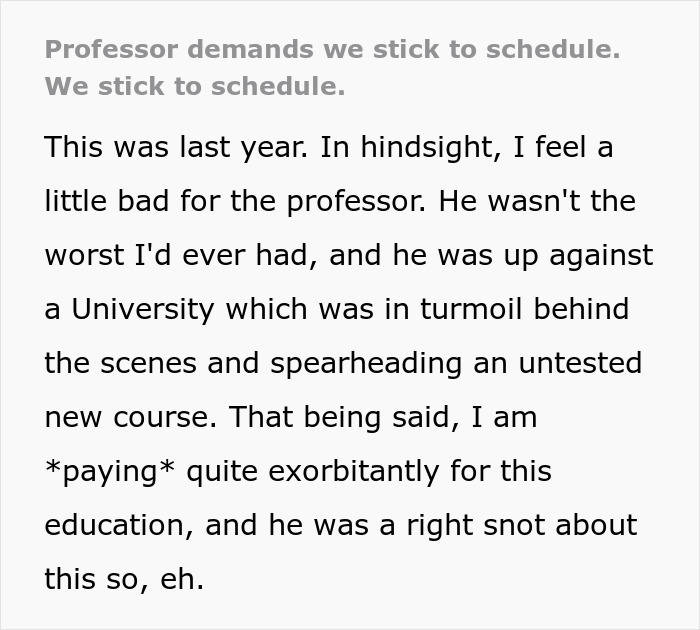
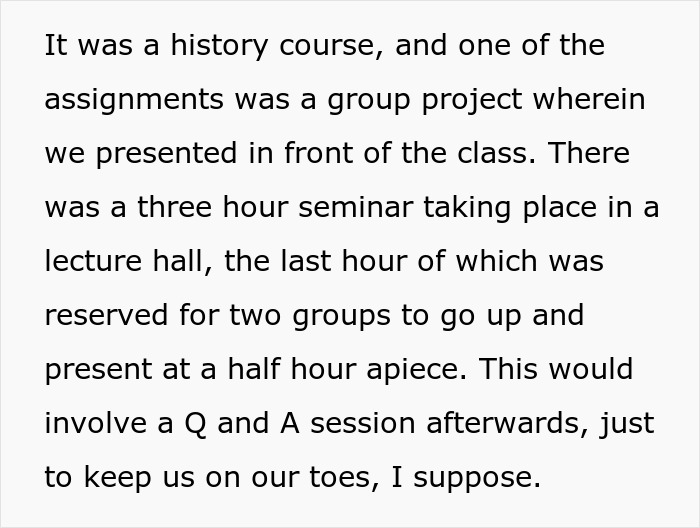
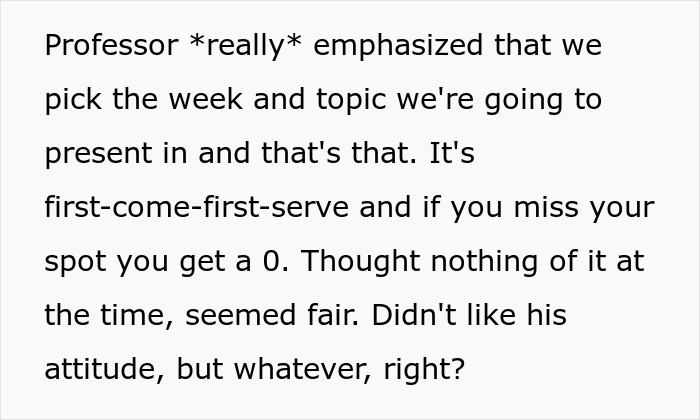
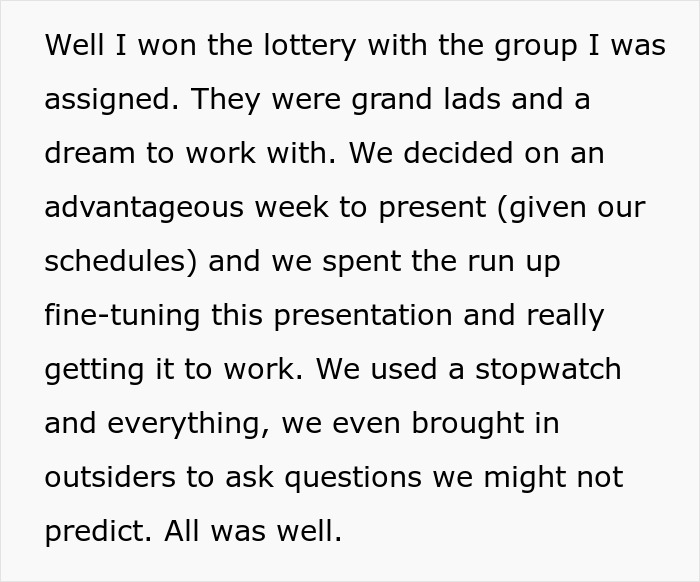
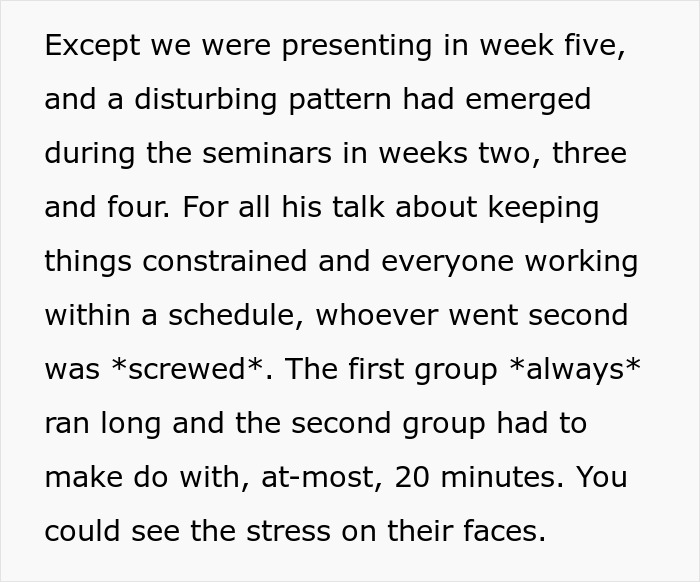
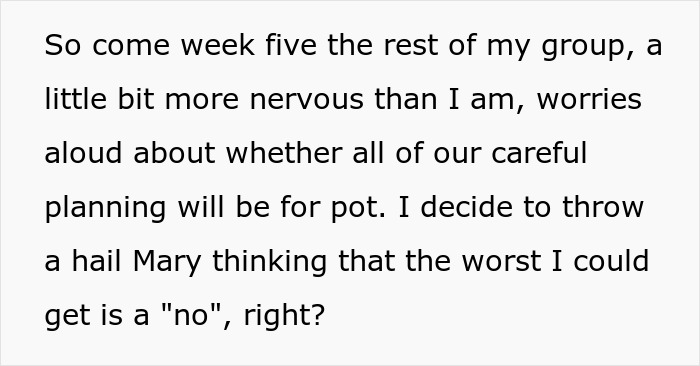
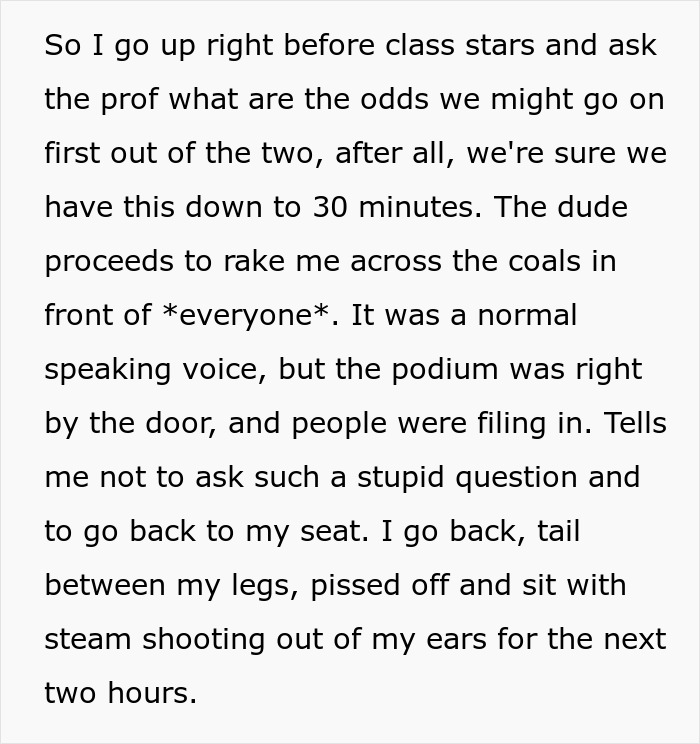
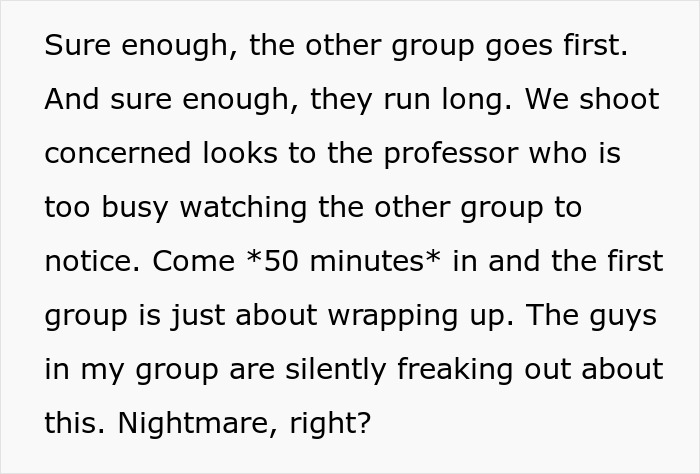

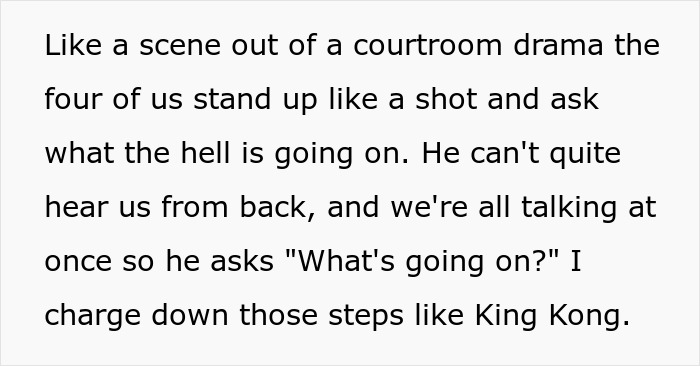
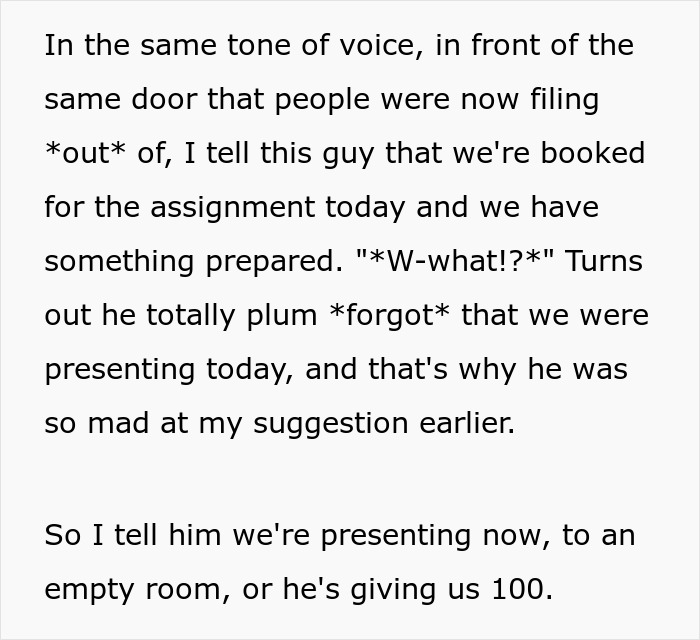

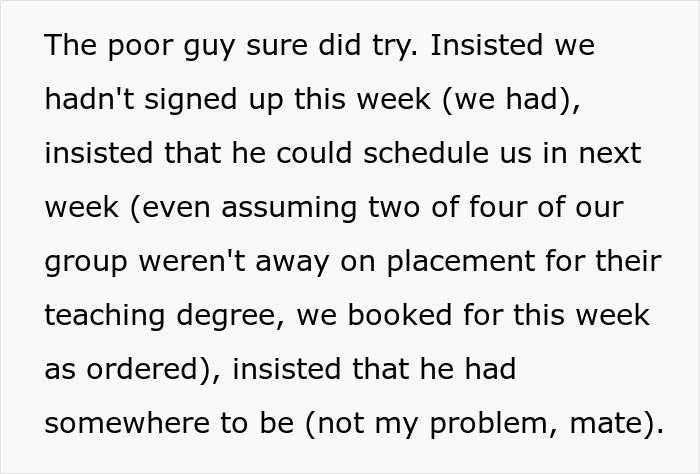
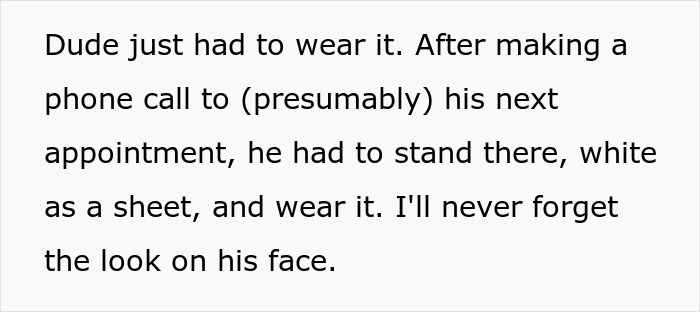
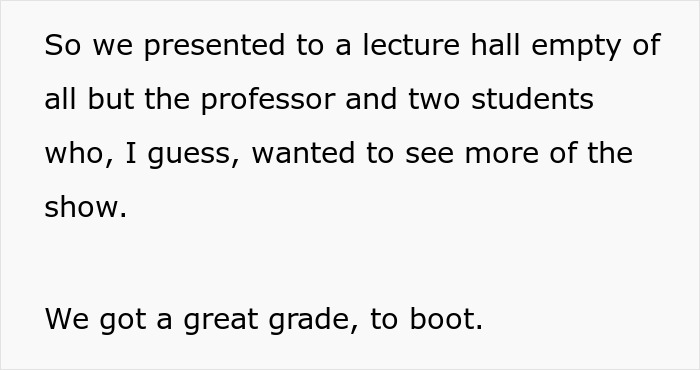
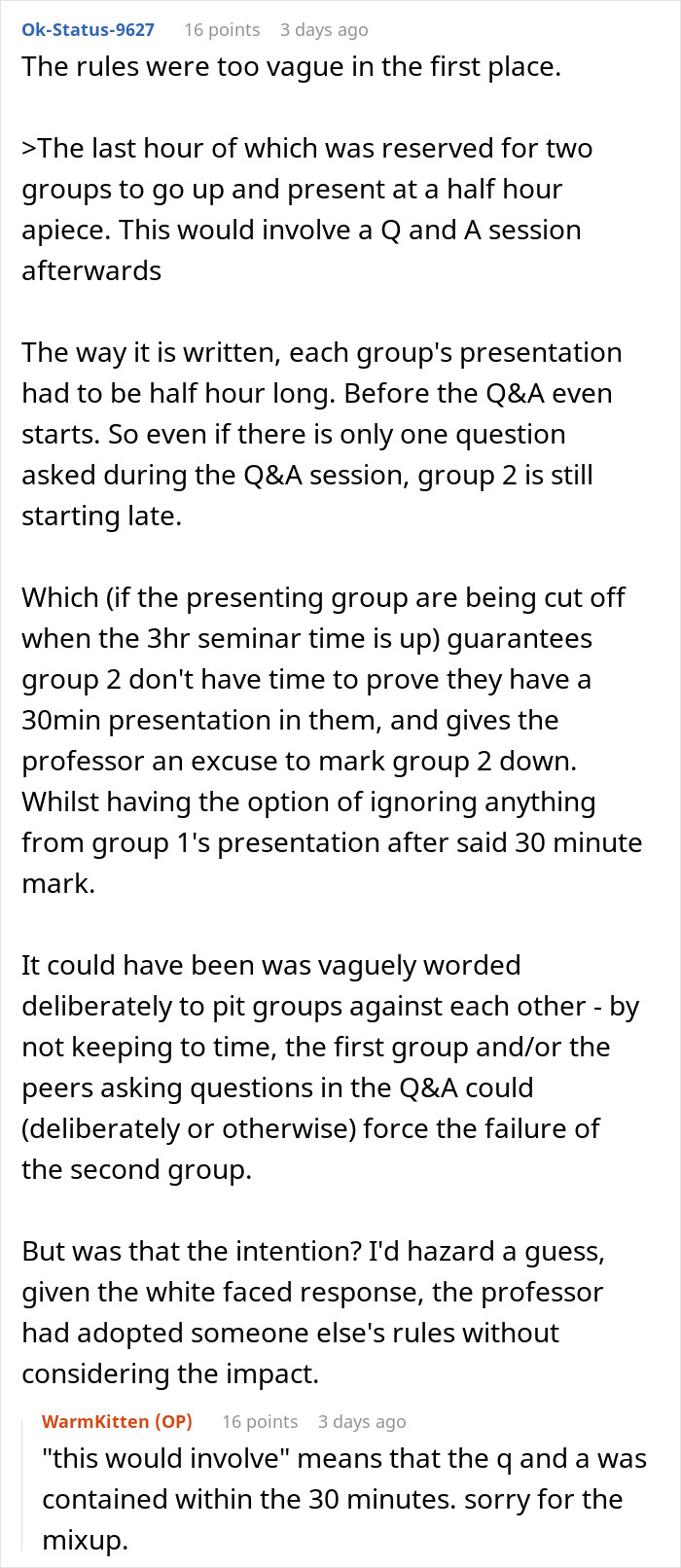
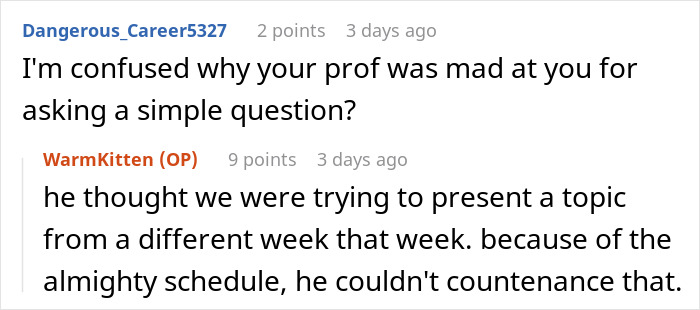
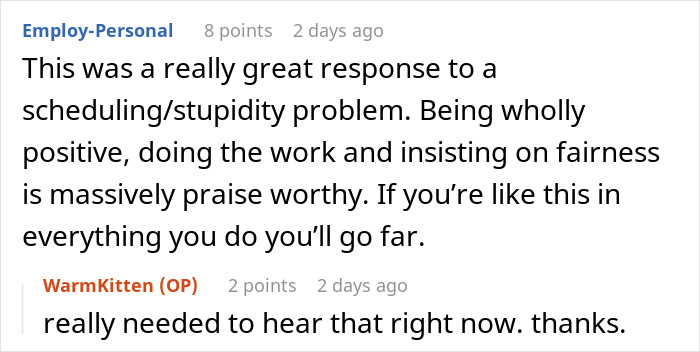

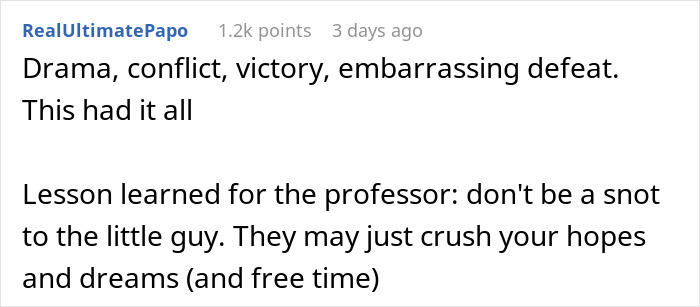

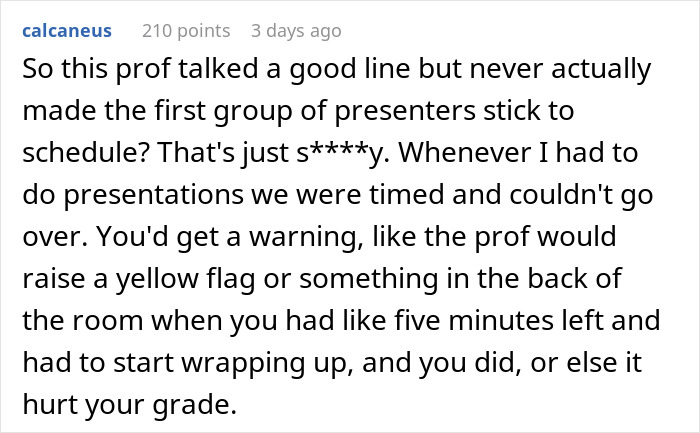






















































32
17